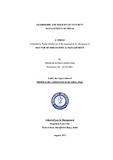Please use this identifier to cite or link to this item:
http://archive.nnl.gov.np:8080/handle/123456789/40| Title: | Leadership and policing in security management of Nepal |
| Authors: | Shrestha, Thakur Mohan |
| Keywords: | Security management -- Nepal Nepal Police Armed Police Force -- Nepal |
| Issue Date: | 5-Dec-2017 |
| Abstract: | A leadership role is a profound variable in the development of a nation and safeguard to the democracy and rock defense to the sovereignty, integrity and nationality in any nation. Equally, leadership has been considered as one of the crucial factors for the success of any organization. Safety, Service and Security are the first and foremost perquisite of any society. These are the most obligation of the respective government. However, what constitutes the effective leaders and what is the status of leaderships is still a subject of study. Peace, security, rule of law, and sustainable development are driving principles in a democratic notion of developing country like Nepal. "3Is': Injustice, Insecurity and Imbalance have been reflecting in the post transitional Nepal. The study came with the objectives of investigating the peoples' perceptions on the adaptation of good leadership style and effective policing, the challenges and expectation in present and future perspectives. The thesis explored the leadership and policing in security management of Nepal. The research problem of this study work aimed at investigating the police leadership status because it is concerned with security and welfare of the country. This research is carried out with a mixed method based on the evaluation of 7 leadership styles, Bass and Avolio (1994)'s "5Is" behaviors, 49 traits, and 28 affecting elements for the development of police officers in Nepal, cross country analysis of 12 required different values/ attributes for executive and senior police officers, this study has used a survey questionnaire from 1111(N) and in-depth interview from 21(N); 21 senior academicians, executives and veterans in face to face interviews; 51(N) respondents in pilot survey from different ways of life and responsibility of all the 75 districts of Nepal. The study finds that there is the need of transformational leadership followed by participative/democratic, authentic and strategic models. Similarly, the research sought the need of system based policing like 'intelligence-led'; 'police public partnership', and 'proactive' respectively. The trait status does not seem sound since the negative traits seem dominant with highest rating ''moderately to mostly", whereas the majority of positive traits are rated with "a little to moderately". Moreover, the transformational leadership behavior is dealt with 'a little to moderately', which needs to be improved. The influence of politicization, political instability, external influence, open border, rampant corruption, nepotism-favoritism, youth-drain; lack of role model leadership and dearth of accountability are the major challenges in the security organizations. Furthermore, most educated and high profile personalities have less interest to encourage their generation in police services. People are expecting proficient and accountable police forces. On the observation of cross-country difference that the top five values/attributes for executive levels which were found in Canada is not same in Nepal. For instance respondents sought the 'effectiveness' in the first preference in Canada was revealed in Nepal 9th priority out of twelve and integrity was rated as the first preference. Similarly, honesty was judged in third preference whereas, it was in 12th (least) priority in Canada. Additionally, with regards to the senior police officers the results display that the communication in the first preference in Canada was revealed in Nepal eighth priority out of twelve and integrity was rated as the first preference. Similarly, responsibility was in tenth in Canada but fourth preference in Nepal. Leadership should be interconnected with 'RARA': Role, Responsibility, Resources and Accountability. The universal values, norms and legal procedures can be the tools to tighten the national security forces for reliable professional service delivery. This principle fits the preferred value system everywhere. If the truth is bitter, let us swallow, it is better to cure the maladies timely. |
| Description: | A Thesis submitted in partial fulfillment of the requirement for the degree of Doctor of Philosophy in Management, School of Law & Management, Singhania University, Pacheri Bari, Jhunjhunu (Raj.), India, 2015. |
| URI: | http://103.69.125.248:8080/xmlui/handle/123456789/40 |
| Appears in Collections: | 300 Social sciences |
Files in This Item:
| File | Description | Size | Format | |
|---|---|---|---|---|
| correction on Thesis 11th Aug Final_sahadev.pdf | 3.74 MB | Adobe PDF |  View/Open |
Items in DSpace are protected by copyright, with all rights reserved, unless otherwise indicated.